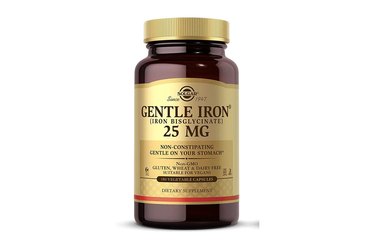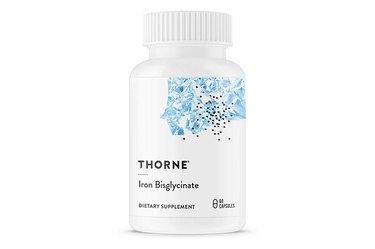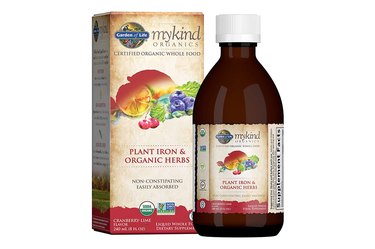
Iron is an essential mineral. If you don't get enough, you may feel fatigued and less focused, as one of iron's important functions is producing proteins that move oxygen throughout your body, according to theNational Institutes of Health(NIH)。
There are plenty offoods high in iron,还有许多食物强化with it. Most of us do just fine with the iron in our diet, per the NIH. But this doesn't apply to everyone: "The most common reason for iron supplementation is to improve low iron levels," says Cristina Caro, RDN, LDN, Sodexo regional dietitian and wellness manager. This can occur for a variety of reasons, such as pregnancy or a vegan diet.
Video of the Day
And while iron supplements are readily available, some can cause digestive issues, including constipation. It's not completely clear why iron supplements lead to constipation, saysAmy Shapiro, RD, CDN, founder ofReal Nutrition.
Generally, water helps move stool out of the body, Shapiro says. "But researchers believe excess iron causes water to move more quickly into the small intestine, leaving less water to move throughout the digestive tract. This can lead to constipation in the colon," Shapiro says.
Fortunately, there are some non-constipating iron supplements out there that may help you avoid the uncomfortable side effects. Check them out below.
Our Picks
- Best Overall:NOW Supplements Non-Constipating Iron ($8.27,Amazon.com)
- Best for Vegans:Solgar Gentle Iron ($32.16 for a two-pack,Amazon.com)
- Best for Athletes:Thorne Research Iron Bisglycinate ($13,Amazon.com)
- Best Liquid Form:Garden of Life Mykind Organics Plant-Sourced Iron + Herbs ($24.50,Amazon.com)
Types of Iron Supplements
There isn't just one type of iron supplement available. You can choose between iron salts and amino acid chelates, which are often easier on the stomach, Caro says.
If you're looking to avoid constipation, opt for ferrous bisglycinate (an amino acid chelate), Caro says. Or, try ferrous gluconate, an iron salt formulation that absorbs well, she adds. "Avoid ferrous sulfate if constipation is a problem for you."
And keep in mind that what you eat plays a role if you're taking iron supplements. Make sure you're getting enough fiber and drinking plenty of water, Shapiro says. "This will help you avoid constipation."
Note: While some fiber is OK, make sure to avoid taking iron pills within two hours of eating high-fiber foods or fiber supplements, per theNational Library of Medicine(NLM). Doing so inhibits iron absorption, according toCambridge Memorial Hospital.
How Long Should You Take Iron Supplements?
For people who are deficient, iron levels in the blood generally return to normal after about two months of taking supplements, and you should continue taking them for six to 12 months to build up your iron stores, according to the NLM.
How We Chose
Any trip down the vitamin aisle — or Google search — will reveal a slew of supplements available to buy, many with bold claims. There's no oversight to supplement safety and efficacy by theFDA, although the organization does setCurrent Good Manufacturing Practices(CGMPs), which include requirements for preparation and storage.
For this guide, we only selected iron supplements with CGMPs compliance or verification from one of the three main independent quality control groups that test and review supplements:
We also consulted with experts — Caro and Shapiro — for insights and recommendations, and factored in details from the ConsumerLabIron Supplements Review.
1. Best Overall: NOW Supplements Non-Constipating Iron
This non-constipating iron supplement is the top pick from ConsumerLab. "Now Iron is a reputable brand with third-party testing," Caro says. One capsule has 18 milligrams of iron, which is appropriate for people who require ongoing iron supplementation, such as vegetarians/vegans and endurance athletes, she says.
This pill contains ferrous bisglycinate, which is a form of iron often recommended for people looking to avoid constipation and other side effects iron can have on the stomach. This form of iron absorbs well when taken with food (better than ferrous sulfate), per ConsumerLab. "It's much easier on the digestive system," Shapiro says.
The supplement is also free from soy, nuts, dairy and eggs.
Buy it:Amazon.com;Price:$8.27
2. Best for Vegans: Solgar Gentle Iron
Solgar is another reputable brand, Caro says. This pill has a "non-constipating chelated dose for everyday use."
Vitamins from Solgar are made in the United States and do not contain common additives and allergens such as gluten, wheat, dairy, soy, sugar, sodium, yeast or artificial flavors. They're also vegan and Kosher-certified.
Buy it:Amazon.com;Price:$32.16 for a two-pack
3. Best for Athletes: Thorne Research Iron Bisglycinate
"I like Thorne as it is a brand known for high-quality supplements," Shapiro says. (Note that this brand also makes the LIVESTRONG.com list oftop vitamin brands.) This iron supplement from Thorne is easy on your digestive tract, Shapiro notes.
Athletes will appreciate that it is NSF Certified for Sport, Caro says. That means it's free of the substances banned by sports organizations, she explains. "This chelate form of iron is easily absorbed and less likely to cause constipation," Caro says. This option is approved by ConsumerLab, too.
Each pill provides 25 milligrams or 139 percent of your daily value (DV) of iron.
Buy it:Amazon.com;Price:$13
4. Best Liquid: Garden of Life Mykind Organics Organic Plant-Sourced Iron
If you'd prefer to avoid a pill, you might want to try this liquid iron supplement as another way to take in more of the nutrient. Shapiro says it's a great option because it also contains vitamin C, which may help improve iron absorption in the body.
That said, vitamin C is not an essential ride-along companion to iron supplements. A randomized clinical trial had participants withiron deficiency anemiatake iron alone or iron with vitamin C. Both hemoglobin recovery and iron absorption were the same across both groups, suggesting that vitamin C isn't required for iron absorption, per the November 2020 study inHematology.
This liquid supplement is vegan. For adults and children over the age of 6, a serving size is about 2 teaspoons and has 10 milligrams of iron, which is 56 percent of the DV for adults. For kids between six and eight years old, that's 100 percent of the daily value, and for kids ages nine to 13 years, that's 125 percent of the DV, according to theMayo Clinic.
This iron supplement also includes vitamins C, B6 and B12 (in pretty high amounts). Be sure to check the ingredient list on this food-based product to confirm there's nothing on it that you are trying to avoid.
Garden of Life MyKind products are safely manufactured by CGMP facilities.
Iron Deficiency in Children
Iron deficiency in children is common, and it can affect their growth and development, per the Mayo Clinic. Your child's iron levels should be monitored by their pediatrician to determine if supplements are necessary.
While liquid iron may be a good option for children, this particular vitamin from Garden of Life may be too high in vitamin B12. Talk to your child's pediatrician before giving them any iron supplement.
Buy it:Amazon.com;Price:$24.50
What to Know Before You Buy
Here's what you need to know before you consider adding an iron supplement to your daily routine.
Not Everyone Needs Extra Iron
"Try to meet your needs for iron with food first," Shapiro says. Iron-rich foods include leafy greens, meat, poultry, fish, grains and dried fruit, per ConsumerLab. Some foods are also fortified with iron, such as cereal and bread.
It's also worth noting that the form of iron found in animal-based foods is more readily absorbed by the body than plant-based forms, Shapiro says. That can make it harder for vegans and vegetarians to hit their DV for iron. Other people at a higher risk for an iron deficiency, according to theHarvard T.H. Chan School of Public Health, include:
- People who are pregnant or menstruating
- Children and the elderly
- Endurance athletes
People who donate blood often or people with certain diseases (such as rheumatoid arthritis and some types of cancer) may also have low levels of iron, per the NIH.
Check the Elemental Iron
Before purchasing a supplement, "look for the amount of elemental iron," Shapiro says.
There may be two numbers listed on the label of an iron supplement — one is the chemical compound (eg, the amount of iron bound to the salt) and one is the elemental iron, or the amount of bioavailable iron, per the Harvard T.H. Chan School of Public Health. Elemental iron is the one you need to pay attention to, as this is the amount available for your body to absorb.
Beware of Interactions
"If you have not been prescribed iron, talk with your doctor before you start taking a supplement," Caro says. "Iron can interact with other supplements and medications, such as antacids and calcium."
Choose Reputable Manufacturers
"Look for reputable brands with third-party testing/verification," Caro says. Typically, you can find this info on the product label or company website.
Be on the lookout for proprietary blends, because those could be made with ingredients you're looking to avoid or have allergies to, she adds. You can tell by reading the ingredients label on your product and identifying if there are other vitamins, herbs or ingredients in the supplement.
Check the dose, too, Shapiro says. High doses of iron can lead to stomach issues, per the NIH. And you definitely don't want to overdo it, because extremely high doses can lead to life-threatening concerns.
If you suspect you're iron deficient, make sure to talk to your doctor before you start taking supplements. A blood test can help you determine whether or not iron supplements are needed.
- National Institutes of Health: "Iron"
- ConsumerLab: "Iron Supplements Review (Iron Pills, Liquids and Chews)"
- FDA: "FDA 101: Dietary Supplements"
- FDA: "Current Good Manufacturing Practices (CGMPs) for Dietary Supplements"
- Cambridge Memorial Hospital: "Oral Iron Supplementation"
- National Library of Medicine: "Taking iron supplements"
- Harvard T.H. Chan School of Public Health: "Iron"
- Hematology: "The Efficacy and Safety of Vitamin C for Iron Supplementation in Adult Patients With Iron Deficiency Anemia"
- Mayo Clinic: Iron Deficiency in Children



